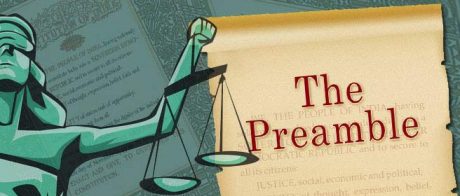What is “justice”, and how is it to be “established”? Simply put, justice is where everyone in a society is treated fairly as equals. When this is not the case we often speak of the “scales of justice” being weighted in favor of one party over another, meaning that the scales have been perverted and justice destroyed. But how is justice “established”? What was the import of listing it in the Preamble to the Constitution and placing it immediately following the purpose of forming “a more perfect union”?
As I pointed out in last week’s essay (The Preamble – Part III: “a more perfect union”), there was a breakdown in justice among the thirteen states; there was no “fairness” among their interaction with one another and between themselves and other nations. The Articles of Confederation were inadequate in righting this lack of justice and the consistency of it among the states, and so there was the need for the creating of “a more perfect union” via this new Constitution.
Returning to the second question with which I began this essay, just how is this Constitution to see that justice is established? The answer begins with the next to last article which proclaims that “This Constitution,…shall be the supreme Law of the Land.” But, you may be asking, what has being the “supreme Law of the Land” have to do with establishing justice? In his outstanding treatise The Law, Frederic Bastiat, towards the end, raises the question “What is law?”, to which he answered “Law is common force organized to prevent injustice; ̶ in short, Law is Justice.” In fact, no less than seven times in the closing of his treatise, Bastiat states that “law is justice.” Note his definition of law – “common force organized”. Such force is why people form societies and establish governments, handing over to it (temporarily, until government begins to abuse its power) the authority to enforce an organized application of law in order to preserve societal order and protect the lives, liberty and property of all. In other words, to ensure that everyone is treated fairly.
So, in turning Bastiat’s phrase around, we could also say that “justice is law”, i.e., justice is brought about by laws that are fair and are equally applicable to all. Such is the intent of the Constitution that follows the Preamble – to see that government is limited and that it treats all citizens under its authority equally and fairly. In other words, “to establish justice.”
-December 2, 2017
